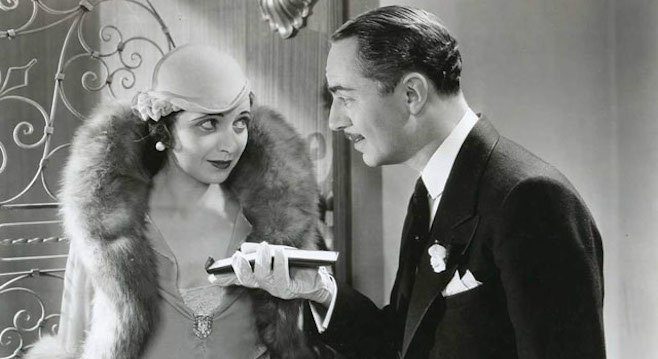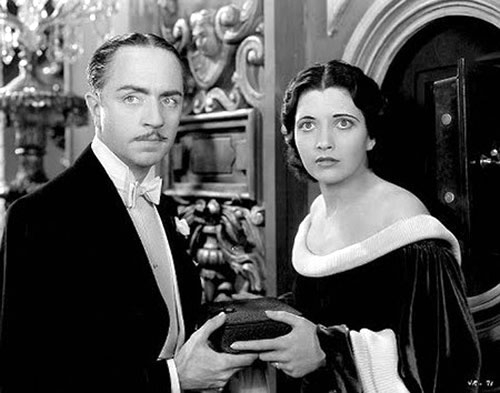Jewel Robbery is like a lattice of spun sugar: intricate, elegant, beautiful to look at and delicious when devoured.
It’s morning in Vienna and a high-end jeweller’s is opening its doors. The grill goes up, the safe opens and reverent hands extract dozens of necklaces and bracelets, the camera closing in to caress each glistening piece. The boutique has just installed a state-of-the-art burglar alarm and its inventor, a bewhiskered Professor Bauman (Lawrence Grant), is here to test it. Bauman explains the intricacies of the system—they do it with rays and mirrors—to the shop’s head clerk. The system is flawless. But there’s one small problem. While they were talking, the shop was robbed.
The robbery is of glancing significance to Baroness Teri (Kay Francis), who is rich, witty and bored. When you are married to age 55 and chronic gout, even your husband’s millions lose their sheen. What Teri needs is excitement. Failing that, she’ll settle for the famed Excelsior diamond, currently in residence at Hollander’s (Lee Kohlmar) shop and the latest gift her husband, Baron Franz (Henry Kolker), has promised her. But when robbers break in during the purchase, Teri discovers a thrill greater than jewellery: a debonair thief (William Powell).
Jewel Robbery takes place in a Vienna that’s never heard of the Great Depression. Teri’s morning routine involves the ministrations of half a dozen maids, who primp and preen her in a bathroom outfitted as her personal spa. To reach her, her staff parades through an antechamber eye-catching in its ostentation: rococo pillars curl upwards; iron candelabra tilt inwards like inverted octopus legs; and a large chandelier hangs from the ceiling. No one, not Teri or her friend Marianne (Helen Vinson), or their social set, or even the flotilla of clerks that lines up to greet the unfortunate Professor Bauman, seems to be worried about money. And rightly so: Jewel Robbery is a fairytale that asks audiences to leave reality at the door.
The film’s insouciance extends to its sense of humour, which revels in the often naughty sensibilities of pre-Code comedy. Erwin Gelsey’s script (based on a play by Ladislaus Fodor) is cavalier not only about wealth, but also matrimony, and laughs both with and at its characters—sometimes simultaneously. Marianne objects to Teri getting the Excelsior diamond “in such a respectable fashion”; Teri claims her lack of affairs is due to a dearth of options, not opportunity. Director William Dieterle shows off his sense of timing, and an eye for innuendo. In one scene, Marianne chats with Teri, who is changing behind a screen. The camera frames Francis from the shoulders up, heavily implying that she’s naked, until Marianne says something shocking and Teri darts forward in surprise—revealing Francis is actually wearing a gown so low cut it doesn’t have a neck so much as bosom line.
Perhaps the greatest surprise for modern viewers is the manner in which Powell’s thief renders Hollander pliable. In a scene which would have been unthinkable just two years after the film’s release, the Robber insists the jeweller try one of his ‘special cigarettes’. A few minutes later and the poor man is high on marijuana.
There’s no need to use a cigarette on Teri; she’s already having fun. Jewel Robbery gives her (and Kay Francis) one of the great introductions: we first see Teri in her bathtub, perfectly coiffed, immersed in bubbles up to her neck, playing with a bar of soap and kicking her legs in the air with childlike whoops of glee. One of her maids watches her and smiles indulgently. Teri is made for extravagance; it wouldn’t occur to her to live any other way. Francis plays her with elan, making a cosseted coquette outrageous enough to laugh at, but not so spoiled we cease to care.
William Powell’s thief is the perfect foil. The Robber, who remains nameless, belongs to the Arsène Lupin school of burglary: he even tells his victims he was trained in Paris and finds Gallic finesse more satisfying than American smash-and-grabs. Powell had a sophistication all his own. He could never be dishevelled onscreen; the universe wouldn’t allow it. Even in My Man Godfrey, where he plays a bum, he brings such style to his tramp outfit that it isn’t surprising when he reappears dressed immaculately just one scene later. The Robber is a connoisseur who prides himself on his taste and professionalism. Powell’s beautiful diction makes Gelsey’s lines sparkle. Appraising various pieces with a loupe, he notices Hollander’s dismay and asks if his goods are insured for the full value. When the jeweller says yes, Powell replies, “Well then, why look so tragic? Be happy that in these unspeakably bad times, I’m turning your merchandise into cash for you.”
Jewel Robbery is a joy from start to finish. My only complaint is that it feels too short. Perhaps that’s fitting. Like the best desserts, it leaves you wanting more.


Leave a Reply